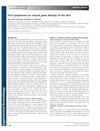 15 citations,
April 2003 in “Journal of dermatology”
15 citations,
April 2003 in “Journal of dermatology” Alopecia areata causes hair loss due to an immune attack on hair follicles, influenced by genetics and environment.
6 citations,
March 2020 in “Anais Brasileiros de Dermatologia” CTLA4 gene variants are not linked to alopecia areata in Monterrey's Mexican population.
 January 2012 in “Elsevier eBooks”
January 2012 in “Elsevier eBooks” Hair loss can cause emotional and social issues, and various treatments, including medication, surgery, and psychological support, are needed.
 June 2023 in “Dermatology and therapy”
June 2023 in “Dermatology and therapy” The Middle East and Africa need better data, treatment consensus, and support for Alopecia Areata.
 September 2022 in “Skin appendage disorders”
September 2022 in “Skin appendage disorders” Seborrheic dermatitis may contribute to the development of central centrifugal cicatricial alopecia.
 4 citations,
January 2019 in “PubMed”
4 citations,
January 2019 in “PubMed” Patterned hair loss in women is linked to hormonal imbalances and biochemical changes, and should be evaluated for underlying health issues.
33 citations,
June 2021 in “Dermatologic Therapy” COVID-19 vaccines can trigger autoimmune flares but are still beneficial for patients with autoimmune conditions.
 31 citations,
September 2006 in “The Journal of Clinical Endocrinology & Metabolism”
31 citations,
September 2006 in “The Journal of Clinical Endocrinology & Metabolism” Testosterone therapy may slightly improve sexual function in postmenopausal women, but its long-term safety is unknown.
 September 2019 in “Journal of evolution of medical and dental sciences”
September 2019 in “Journal of evolution of medical and dental sciences” Obesity significantly affects skin health, causing conditions like acanthosis nigricans and skin tags, and should be considered during skin exams.
 July 2015 in “Cambridge University Press eBooks”
July 2015 in “Cambridge University Press eBooks” The document concludes that careful history and physical exams are crucial for accurately diagnosing polycystic ovary syndrome and distinguishing it from other similar conditions.
 243 citations,
September 2016 in “Dermatology and Therapy”
243 citations,
September 2016 in “Dermatology and Therapy” Dermoscopy is a useful tool for identifying features of skin conditions, but more research is needed to define its role in dermatology.
 10 citations,
November 1997 in “British Journal of Dermatology”
10 citations,
November 1997 in “British Journal of Dermatology” A 10-year-old boy had the earliest reported case of hair that became progressively kinkier but eventually returned to normal on its own.
 1 citations,
January 2020 in “Journal of quality in health care & economics”
1 citations,
January 2020 in “Journal of quality in health care & economics” Most Sudanese married women in the study used contraceptives and knew about them, but many didn't know about emergency contraceptives or extra benefits beyond family planning.
2 citations,
September 2014 in “Nature reviews. Drug discover/Nature reviews. Drug discovery” Specific immune cells cause alopecia areata and blocking certain proteins can prevent it.
 6 citations,
January 2017 in “Annals of Dermatology”
6 citations,
January 2017 in “Annals of Dermatology” More exercise might link to hair loss, but other factors also matter.
 February 2009 in “Springer eBooks”
February 2009 in “Springer eBooks” Hyperpigmentation is common in pregnancy and may not fully fade after birth; melasma, also frequent, can persist but has limited treatment options during pregnancy.
 January 2003 in “Postgraduate medicine”
January 2003 in “Postgraduate medicine” The article concludes that hair loss has many causes and treatments, with medication options like finasteride and minoxidil for men, and minoxidil, hormones, or iron for women, while warning against unproven remedies.

Metformin can cause rare severe skin reactions.
 January 2023 in “Journal of Cosmetic Dermatology”
January 2023 in “Journal of Cosmetic Dermatology” Some children may develop hair loss after having COVID-19.
 34 citations,
November 2008 in “British Journal of Dermatology”
34 citations,
November 2008 in “British Journal of Dermatology” Hair extensions can cause hair loss and scalp damage, and these problems might be more common than people realize.
19 citations,
July 2017 in “Clinical and experimental dermatology” Men with lichen planopilaris had earlier onset than women, and treatment usually improved the condition.
 50 citations,
March 2000 in “American Journal of Clinical Dermatology”
50 citations,
March 2000 in “American Journal of Clinical Dermatology” Alopecia Areata has no guaranteed treatment for hair regrowth, but options like corticosteroids and minoxidil are used, with future research focusing on genetic and immune therapies.
 9 citations,
March 2012 in “Experimental dermatology”
9 citations,
March 2012 in “Experimental dermatology” Natural gene therapy shows promise for treating skin disorders like epidermolysis bullosa.
 19 citations,
March 2018 in “Journal of Investigative Dermatology”
19 citations,
March 2018 in “Journal of Investigative Dermatology” The gene Msx2 is crucial for hair follicle regeneration during wound healing.
 147 citations,
January 2003 in “American journal of clinical dermatology”
147 citations,
January 2003 in “American journal of clinical dermatology” The document concludes that accurate diagnosis of ichthyosis is crucial for treatment and genetic advice, and ongoing research is needed for better therapies.
 4 citations,
October 2022 in “Genes”
4 citations,
October 2022 in “Genes” Our microbiome may affect the development of the hair loss condition Alopecia Areata, but more research is needed to understand this relationship.
 61 citations,
January 2017 in “Human Reproduction Open”
61 citations,
January 2017 in “Human Reproduction Open” The review recommends hormone replacement therapy for women with premature ovarian insufficiency to manage symptoms and protect health, with specific approaches for different groups.
 June 2017 in “Journal of clinical and investigative dermatology”
June 2017 in “Journal of clinical and investigative dermatology” Red blood cell folate levels are reliable indicators of long-term folate status in alopecia areata patients.

Different genes cause Female Pattern Hair Loss compared to male hair loss, and treatments vary, but more research is needed to understand it fully.
 April 2023 in “Dermatology practical & conceptual”
April 2023 in “Dermatology practical & conceptual” Lenalidomide helps hair follicle stem cells turn into melanocytes, which may improve repigmentation in vitiligo.


























